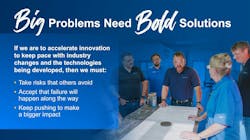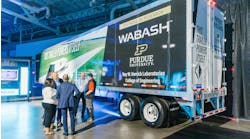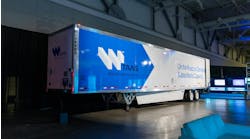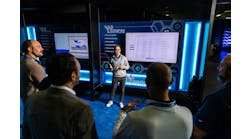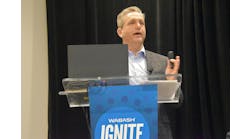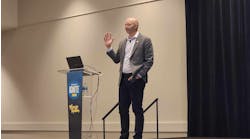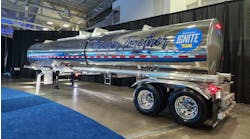Solving problems requires collaboration, 'vulnerability': Wabash CEO
LOUISVILLE, Kentucky—"Empathy" and "vulnerability" are not buzzwords typically associated with big American manufacturing. However, that’s precisely what Wabash President and CEO Brent Yeagy is calling for to mitigate the complexity and risk associated with the global supply chain.
“There's some fear in being vulnerable; there's some fear in talking about what it really takes for you to be successful and to be transparent and to be honest and to take that risk,” he said. “We want to be an organization that can bring people together to work in a different way. We'll have our transactional conversations, which are part of business—whether we're selling or buying—but we can have different conversations. We can have that when we have empathy for each other when we're all trying to figure out how we do what we do in this crazy world that we live in.”
Yeagy delivered his remarks during the opening session of the Wabash Ignite conference here, which was themed "Stronger Together." It’s the second such gathering of suppliers, dealers, and customers, following up on the inaugural event two years ago. But the push behind the company’s trademark “Changing How the World Reaches You” has been underway since before the One Wabash rebranding initiative was announced in late 2021.
And some “green shoots” of that collaboration are emerging, Yeagy noted.
“Each of you was specifically invited because you’re part of our ecosystem, and we have to plan on being bold together,” Yeagy said. “We still have to find a way of leaning forward, even when we're at the tail end of the longest freight recession that we've seen in our lifetime.”
Inefficiency is an obvious target
Citing statistics from the American Trucking Associations, Yeagy pointed to a 35% inefficiency for over-the-road trucking resulting from trucks pulling empty trailers. Extrapolating that level of waste across the modes of the supply chain means that a “measly” 1% improvement would be “the greenest initiative known to man.”
But even that modest goal is easier said than done for an industry as fragmented as trucking, with the 10 largest carriers accounting for only a 6% market share, as Yeagy detailed.
And fleets are desperately seeking solutions—except everyone also wants a competitive edge, and that means solutions are proprietary and can’t be scaled, Yeagy suggested. So what’s the point of industry suppliers investing the resources required to solve these problems, one customer at a time?
The key is to “rise above” short-term needs, Yeagy emphasized, characterizing those immediate challenges, while necessary, as “table stakes.”
“The problem is not about incremental improvement—solving what we’ve got to do to make the numbers one year, or two years, or three years out,” Yeagy said. “But not everyone wants to show up and talk about bold solutions—that is an uncommon virtue in most organizations."
“When you think about commercializing new and innovative products, when you think about moving beyond just incremental improvement of products we’ve produced today or the services or solutions that we provide, how do you create scale? If you really want to change how the world reaches you, you have to solve that issue. Or we’ll just play around the edges of the products we produce today.”
"Again, the answer is straightforward: To bring a superior solution set to the market means bringing people (and organizations) together to pool assets and capabilities to 'create real synergy' and 'make real impact in this greater world of logistics,'" he continued.
Old solutions don’t solve new problems
Too often, however, customers frame the relationship with a supplier based on the past—the products or services offered—and, as Yeagy explained, they don’t even understand the real question.
“How do we have a conversation that strips that history away and just says, ‘but what do you need?’” Yeagy asked. “Then, once we know that, we can think about the ecosystem, bring the parties together, and together we can solve what they need—not what they think we can provide. And that’s a different type of conversation.”
And, very likely, not an easy one.
“Sometimes, you don’t really want to talk about ‘what you need’—but sometimes that’s where innovation can take place,” he said.
Or, as in hockey, success comes from directing the company “to where the puck is going, not where it is now,” Yeagy added.
“We think about an ecosystem with Wabash being the initial vulnerable party, and I keep telling my people that it’s about trust,” he continued. “We have to accept that not everything will go as planned, but there’s nothing that’s stopping us: Okay, we can do that better; we’ve learned something. And now let’s keep going forward.”
‘What if?’
Speaking with FleetOwner afterward, Yeagy quickly pointed out that “not everybody is in the same place” when reimagining the way business is done but, again, “failing to try is failing.” The good news, however, is that the “foundational capability” is now in place, and new partnerships are emerging.
“We’re opening minds and we’re learning how to engage differently: It’s much more than just a one-on-one discussion,” he said. “The promise is here, and we’ll see the fruits in the future.”
And, in fact, the financial performance from a reimagined Wabash will result in 2024 ranking among the five best years in its history—despite a freight cycle that would have decimated the company in the past, Yeagy noted.
“Before, we would’ve been wholly distracted: We would not have continued to invest in our people and products—and we would not have hosted Wabash Ignite,” he said. “But we still have to perform for our different stakeholders, with different goals, so we continue to focus on the basic blocking and tackling, hitting our incremental targets.”
As to what will make for a successful Wabash Ignite conference this time around, Yeagy suggested he’ll be listening for the casual conversations that follow the formal presentations on leadership, logistics, and the future.
“Are people talking in ways that aren’t transactional?” he said. “Are they coming together to say ‘what if’?”

